Jul 2006
Jul 2006 sadmin2010 - We are on track
2010 - We are on track sadmin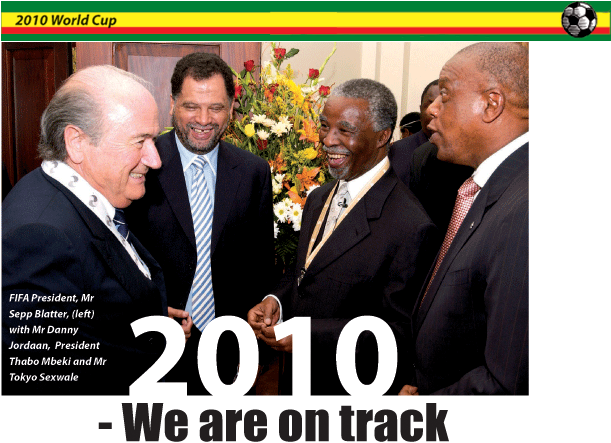
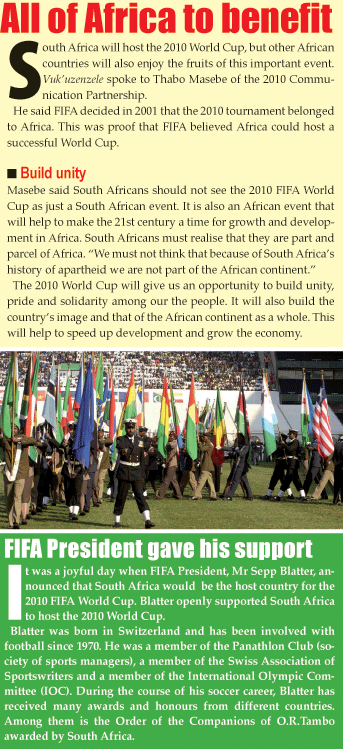
“Just imagine this: One minute you are at the stadium watching Ronaldhino doing his tricks with the ball. Before you know it, you are watching a different game - the Big Five (lion, elephant, leopard, buffalo and rhino) showing off their muscles in a nature reserve. And when the sun sets, you go back to a luxury hotel with modern technology.” Danny Jordaan, head of the Local Organising Committee for the 2010 World Cup, told Vuk’uzenzele these are just a few of the special things that overseas visitors to the 2010 World Cup can see in South Africa. Apart from the soccer, the wildlife and the beautiful scenery, they will be surprised to see how rich the country is in tradition, history and modern technology.
- ‘African World Cup’
This will be a World Cup like no other. “It’s like having everything that exists on earth in one place,” Jordaan said. He spoke of the first FIFA World Cup to be held in Africa. This ‘African World Cup’ will be very different from the ones held in Europe, he said. “In European countries, they have problems like soccer racism, fighting among supporters and damaging of stadiums. In South Africa, people who support different sides enjoy the game together.”
- Preparations
“We have a budget of R3,4 billion for this event,” Jordaan said. “Preparations are well on track and FIFA is happy that many of their expectations have been met well before time.” The biggest challenge is building five new stadiums to be ready by 2010. He said all the necessary steps are in place. For instance, planning of roads leading to the stadiums, is also on track. A Host City Forum has been started. This means the Local Organising Committee meets once a month with the host cities to talk about how their plans are going.
Soccer legends
Jordaan said soccer legends like Abedi Pele of Ghana, Kalusha Byala of Zambia, George Weah of Liberia and Hossam Hassan of Egypt were appointed to work with the Local Organising Committee. They will tell people in other African countries about the World Cup and how they can get involved.
South African soccer greats like Jomo Sono, Lucas Radebe and Mark Fish are also working with the Local Organising Committee.
Benefits
Jordaan said a lot of people will benefit from this tournament. After the World Cup, South Africa will have changed for the better. We will have at least five world-class stadiums and some good roads that we did not have before. In the past, good facilities were only built for rugby and cricket, he said.
Jordaan said the training venues that will be upgraded in townships and other areas around the cities, would also help to make young people more interested in soccer.
Bafana Bafana
When the World Cup in Germany is over, the world will focus on South Africa.
And as we are moving faster towards the big day, what could be the biggest challenge? “Bafana Bafana,” he said. “We want a team that will be able to compete and go a long way into the tournament.” - Ndivhuwo Khangale
ABC of HIV and AIDS
ABC of HIV and AIDS sadminSouth Africa is making progress in implementing its programme to fight HIV and Aids, but there are many challenges. Working together we can overcome the challenges of HIV and Aids.
United Nations
A special conference on HIV and Aids was held at this year’s United Nations General Assembly in New York. Representatives at the conference heard about progress in implementing South Africa’s comprehensive HIV and Aids programme. This programme focuses on how to prevent, treat and manage HIV and Aids.
Managing the disease
The programme deals with actions to prevent and treat HIV and Aids mainly through:
- Khomanani communication campaigns;
- Giving out condoms;
- Promoting voluntary counseling, testing and treatment for sexually transmitted infections;
- distributing booklets that teach people about prevention and treatment; and
- Improving access to treatment for all HIV positive people, including pregnant women, children and TB patients.
Many challenges
Progress has been made in managing the disease, but there are many challenges. This includes a need for more trained people like doctors, pharmacists and social workers, especially in the rural areas. To take care of this problem, government is implementing a plan to get people with the right skills to stay in health-care jobs, and to get doctors, nurses and other people to work in rural areas. All the 53 health districts and 63 sub-districts in South Africa have at least one service point for HIV and Aids where patients can go for all kinds of help.
Government is also putting aside more money for HIV and Aids. The amount has increased from R264 million in 2001 to R1,5 billion in 2005.
HIV and AIDS plan
Some of the important functions of the HIV and Aids programme are to:
- ensure that most of the people who are not infected with HIV stay uninfected;
- encourage people to follow the ABC rule – Abstain (from sex), Be faithful (to one partner) and
- Condomise (always use a condom);
- provide antiretrovirals (ARVs), and
- include traditional medicine into the treatment programme.
There is no cure for Aids yet. The best that the Aids management plan can do is to help people living with HIV and Aids to live longer and better lives.
Not a life sentence
A person can be infected with HIV, but not have Aids. Aids is the end stage of HIV infection. The immune system of an infected person becomes weak and unable to fight diseases like TB and pneumonia. An infected person should have a balanced diet (including fruit), have enough rest, exercise regularly and keep stress levels low. People living with HIV should always use a condom during sex to avoid infecting a partner with the disease or getting re-infected. Remember, HIV infection is not a life sentence and one can live a normal life just like any other person as long as you take the necessary advice.
Early treatment
Sexually transmitted diseases can be prevented and some are easy to treat. Early treatment can cure and stop further infection. This includes infection from a pregnant mother to her unborn baby. It also prevents problems in other body parts like the anus, eyes, throat, vagina and penis. All efforts to prevent sexually transmitted diseases are also efforts to prevent HIV infection.
HIV and TB
It is important for a person living with HIV to be tested for TB. TB is curable even if a person is HIV positive. An HIV positive person who also has TB and is not on treatment will become sicker and weaker. If you have TB, you must take your treatment for six months and complete it. You will also be given medicines to prevent other diseases. - Ndivhuwo Khangale
Addressing Disability
Addressing Disability sadmin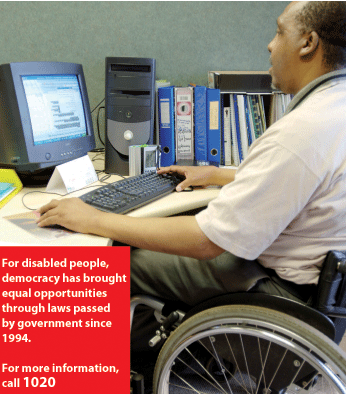 DISABLED: New SA enables everyone
DISABLED: New SA enables everyone
Democracy has opened doors for all South Africans. Our democratic Constitution protects the rights of everyone. Vuk’uzenzele spoke to Benny Palime from the Office on the Status of Disabled Persons (OSDP) in the Presidency, about disabled people’s rights.
In the past
Palime said that in the past the majority of people with disabilities did not feel that they were part of society. They did not have political, social and economic rights. This made it very difficult for most of them to find jobs. It had negative effects on them and their families.
Shortage of skills
Some of the things that have prevented disabled people from finding jobs, included:
- shortage of skills because of poor education;
- employers who would not employ people with disabilities;
- labour laws during apartheid that did not protect disabled people’s rights;
- Public transport that was not easy for disabled people to use; and
- Poor ways of giving information to disabled people.
Basic services
Democracy brought happiness to many disabled people, Palime said. “In the past, it was difficult for disabled people to receive certain services. We now receive all basic services.” He said organisations working with disabled people were also happy. Disability has now been included in government’s list of important matters to attend to. This has given many disabled people hope for a better life.
Protecting rights
There are now bodies such as the Equality Court, the Human Rights Commission and the Public Protector that ensure all people’s rights are protected. Laws that ensure disabled people’s rights are protected, include the Employment Equity Act and the Labour Relations Act. Government’s National Skills Development Strategy helps to ensure that disabled people get training in different skills. This makes it easier for them to find jobs and earn money.
Equal opportunities
In 1997, government approved the White Paper on an Integrated National Disability Strategy. It is a plan on how to make life better for disabled people. Among other things, it encourages government departments to give disabled people equal opportunities to get jobs. Some of the services that disabled people now enjoy are health services, disability grants, housing subsidies and economic opportunities. - Justice Mohale
Asgisa - Helping to get rid of poverty for good
Asgisa - Helping to get rid of poverty for good sadminWith the economy growing stronger people are expecting more and more jobs to acccompany it. The Accelerated and Shared Growth Initiative for South Africa (AsgiSA) also raised a lot of hopes that the economy will create more jobs. Under AsgiSA, government has already started with programmes to unblock the things that are holding back growth.
Jobs for Growth
Jobs for Growth is a national programme that is part of AsgiSA. It will soon be launched. The programme will be run by the Ministries of Land Affairs and Agriculture and of Trade and Industry. It aims to create about a million jobs over the next three to five years. The jobs created through this programme will be mostly for poor people in rural areas and semi-rural areas around the cities. It will support people who want to start small businesses including co-operatives in these areas. It will also help people to develop skills to do so. This will ensure that rural areas do not have to depend on big cities for employment.
For more on AsgiSA and Jobs for Growth, call 1020
Quality products
Deputy President Phumzile Mlambo-Ngcuka was the guest speaker when stakeholders met in April to finalise the plans for Jobs for Growth. Representatives from government, business, labour and NGOs attended the meeting. The Deputy president said the programme would support people to produce quality products that could be sold at good prices in the marketplace. In this way, people will be able to do things for themselves rather than having things done for them. “It must ensure that people come out of poverty for good,” she said. The country’s economic growth must be shared by all South Africans, Mlambo-Ngcuka said. There have been a number of plans in the past to fight poverty, but they have not focused enough on those with few opportunities, like farm workers and uneducated women. Jobs for Growth will ensure that many of those jobs go to poor women. They will also be encouraged to join self-help groups.
The youth
The youth will also be involved in this programme and will be informed on how they can take part.
More details on the Jobs for Growth programme will be made known later this year.
- Ndivhuwo Khangale
Cartoon strip: Credit
Cartoon strip: Credit sadmin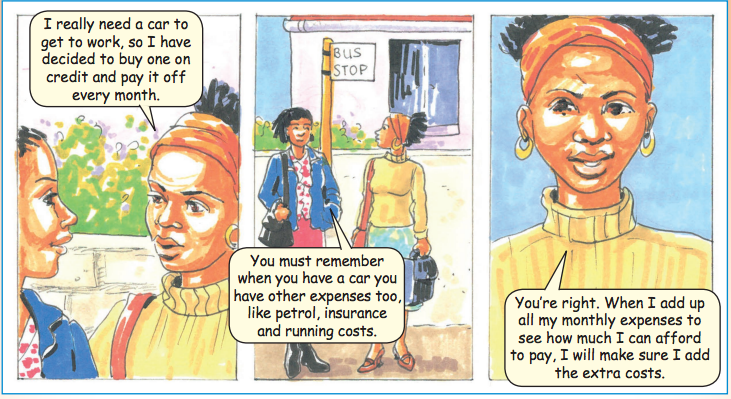
Changes to cabinet
Changes to cabinet sadmin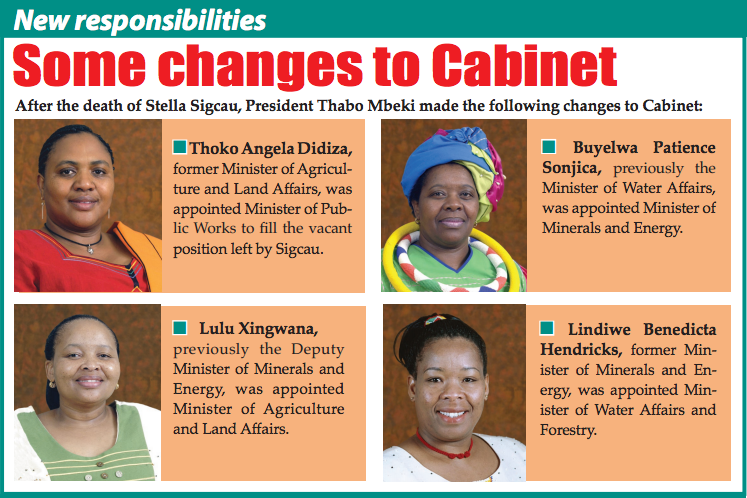
Comic strip - Arts
Comic strip - Arts sadmin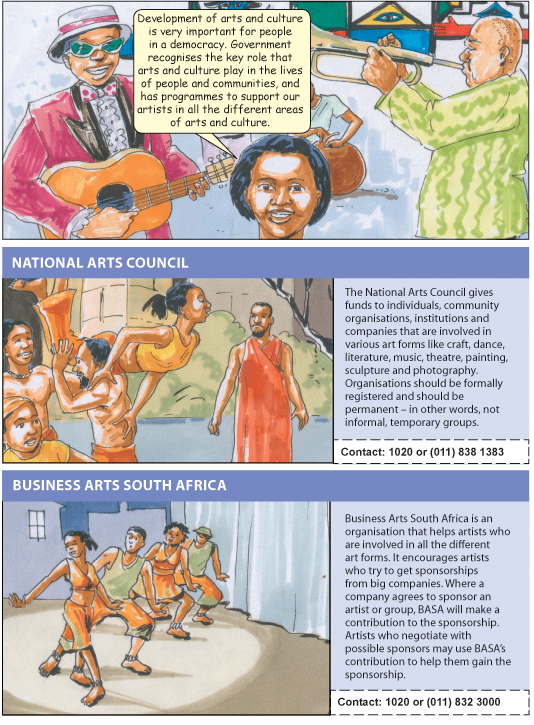
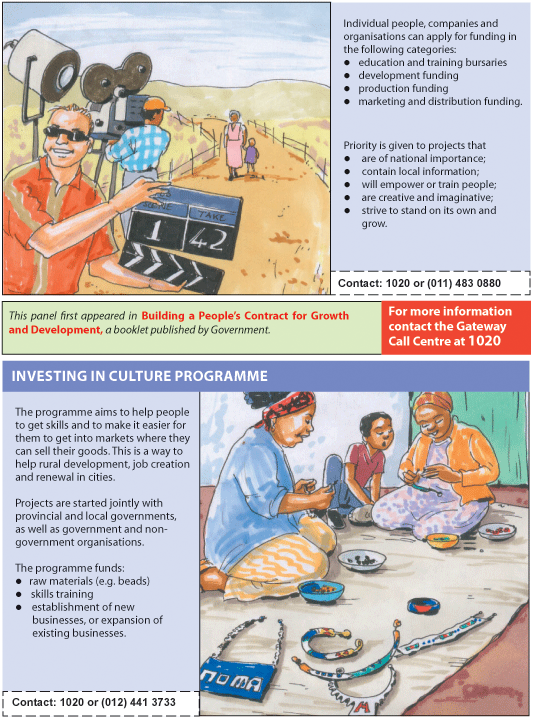
Health advise: Mental illness - don’t just suffer in silence
Health advise: Mental illness - don’t just suffer in silence sadmin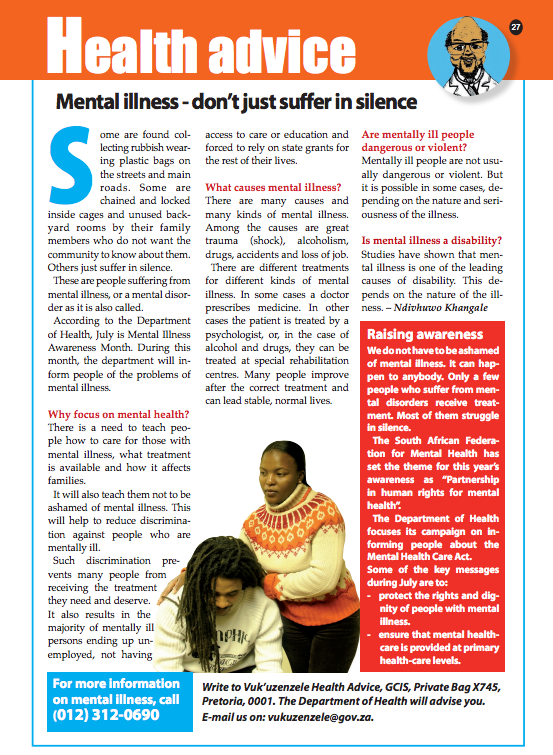
How our Government works
How our Government works sadminGovernment is made up of national, provincial and local representatives.
The National Parliament makes the country’s laws in accordance with the Constitution. Parliament is made up of two houses. They are the:
National Assembly; and the
National Council of Provinces.
The National Assembly and the National Council of Provinces must set up a joint committee. This committee makes rules about the combined business of the Assembly and the Council.
The National Assembly is elected to represent the people and to ensure that government is run by the will of the people.
It does this by:
choosing the President;
providing a public forum to discuss issues;
passing laws; and
overseeing action taken by government.
Members of the National Assembly
The National Assembly usually has between 350 and 400 members. Members are elected every five years. The number of members each political party has in the National Assembly is in line with the number of votes each party won in the election. The Speaker is the head of the National Assembly. The Parliament Building in Cape Town where the houses of Parliament meet. Parliament is opened every year with a special ceremony.
Decisions and laws
When the National Assembly takes decisions it must get the votes of the majority of the members. Voting on most Bills (proposed laws that have not yet become law) may only take place if a majority of members of Parliament are present. The National Assembly may make laws, except on some specific matters on which the provinces can make laws. It has the power to amend (make changes to) the Constitution, if two thirds of its members support the change.
Debates and questions
Issues that are important to the country are debated in the National Assembly. Members of the Assembly may ask cabinet ministers questions. They have to answer in writing or in person in the House.
Portfolio Committees
The National Assembly has 26 portfolio committees - one for each government department. Examples are portfolio committees on housing, welfare, safety and security, education, and trade and industry. Portfolio committee’s duties include making recommendations on law-making, budget and management regarding the department it oversees.
National Council of Provinces
The National Council of Provinces looks after the interests of the provinces. It ensures that matters concerning the provinces are discussed at national level. The Council does this by taking part in making the country’s laws. President Thabo Mbeki delivers his State of the Nation Address in Parliament. He does this at the beginning of each year to announce government’s Programme of Action for the year.
Members of the National Council of Provinces
The National Council of Provinces represents the nine provinces. The Council has 54 permanent members and 36 special representatives. Each province has an equal number of representatives in the Council. This includes the Premier of the province, or a person chosen by the Premier, as head of the representatives. There are also representatives from the South African Local Government Association who come from the nine provincial local government associations. They represent local government, but may not vote. Each provincial group of representatives has one vote that is given on behalf of the province by the leader of the group.
Lawmaking role
The National Council of Provinces discusses, passes, changes, suggests changes to, or rejects Bills. They may start or prepare Bills on certain matters. Only the Minister of Finance may introduce a Bill to do with financial matters.
Debates and questions
Issues that are important to the provinces are discussed in the National Council of Provinces. Members may ask cabinet ministers questions that must be answered in the National Council of Provinces.
The National Council of Provinces has Select Committees that do the same work for the Council as the Portfolio Committees do for the National Assembly.
Izimbizo - Better Service, Faster Development
Izimbizo - Better Service, Faster Development sadmin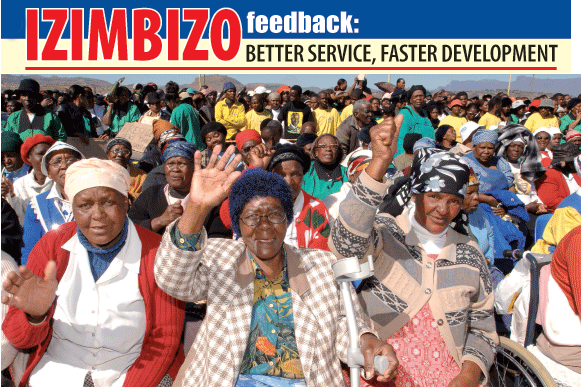
It’s full steam ahead for government to reach out to communities through izimbizo. Izimbizo give government and communities a chance to share ideas and join hands to find solutions together.
Concerns and needs
At izimbizo, government leaders from our national, provincial and local governments, together with government officials visit communities and listen to people’s concerns and needs. This way, communities take part in democracy and assist government with its Programme of Action. This year’s imbizo programme will build on the 2005 izimbizo. It will concentrate on better relations between municipalities and local communities. It will also help municipalities strengthen their leadership to give better services and help economic growth.
AsgiSA
Izimbizo 2006 will also be a chance for government to tell communities how they can be part of the Accelerated and Shared Growth Initiative for South Africa (AsgiSA). During the year, the President’s and Deputy President’s imbizo programmes will continue to focus on municipalities under Project Consolidate. These are municipalities that struggle because they lack facilities and skills. Project Consolidate is a government programme to help strengthen such municipalities. The President will also visit some of the municipalities that were visited last year to see if they have made progress.
First visit
The first presidential municipal imbizo of the year was held in Thabo Mofutsanyane District Municipality in the Free State. President Thabo Mbeki had talks with councillors, mayors, municipal managers, farmers, farm workers, women’s groups and other members of the community. Three izimbizo will be held every month by the President and Deputy President in different areas, until December this year. For more information, call 1020
Door-to-door
This was the first opportunity after the municipal elections on 1 March, for the district municipality’s newly elected councillors and mayors to meet the President. Apart from addressing meetings of residents, President Mbeki also went door-to-door to visit households. One of the things people were happy to hear about was government’s plans to get rid of the bucket system by next year. The President explained that through the izimbizo programme, government became aware of the problems facing ordinary people. He said government was attending to the problems to meet and fulfil the needs of all South Africans.
Business
During the imbizo, local business people talked to President Mbeki about how they could work with government to ensure economic growth and job creation. They also discussed government’s development programmes. “After twelve years of working together, business and government are comfortable with one another,” the President said. “We must work ever closer to grow the economy and to speed up development.” - Justice Mohale
“We must work ever closer to grow the economy and speed up development”
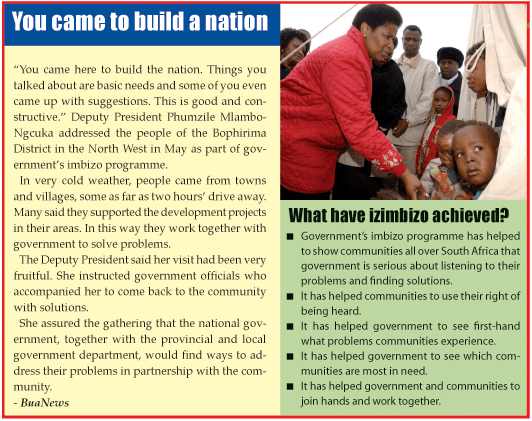
Keeping it brief
Keeping it brief sadmin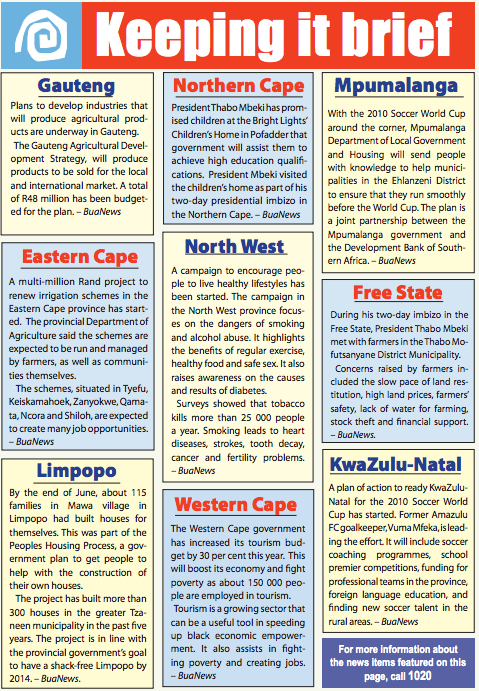
Letters
Letters sadmin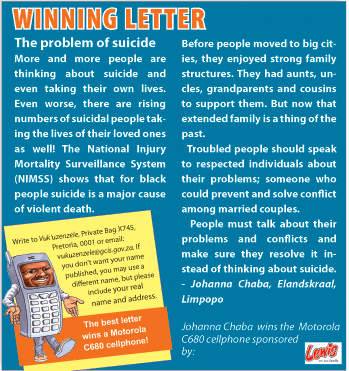 More practical education
More practical education
I am one of those who finished school in a township government school with great hopes of pursuing a tertiary education and getting a good job, but I was disappointed. All my friends who went to private schools are now working.
My concern is government schools don’t teach us how to survive and job-search after matric. They teach us book education, while at private schools they learn practical education.
South Africa is full of bursaries and study loans, but they are not in the spotlight for us township learners to access them.
It’s easy to finish matric, but to get government assistance is difficult. Why can’t government establish government study grants for the poor? - Thokozani Petrus Sithebe
Mhluzi Township, Mpumalanga
Reply from the Department of Education:
Government established the National Student Financial Aid Scheme (NSFAS) through which students can access funds. For 2006, over R1,3 billion has been made available for loans and bursaries. Qualifying students can apply for these funds at the Student Financial Aid Office of the institution where they are registering, or call 021 793 3200; fax 021 797 8416 for more information. Regarding job opportunities, Higher Education South Africa and the Department of Education have jointly published a booklet for Grade 9 with information on careers after matric. Umsobomvu Youth Fund and the National Youth Commission can also be contacted about opportunities for young people. (Phone 1020 for details). Government is committed to improving schools in disadvantaged areas.
What a shame
Our government says: “embrace disability with dignity,” but I found that there’s nothing like that in our communities, in the streets, in our churches, schools and towns. “Nothing about us, without us” is the slogan of disabled people in South Africa and our government is very familiar with it. What a shame Stutterheim! In our streets there’s nothing for people with disabilities, e.g. ramps and parking. Also our taxi rank, which is a public place, is not accessible. I am very worried about this. - Mlungisi Diko, Stutterheim, Eastern Cape
TV is a monster
I’m sorry to say this, but TV is a monster. It shows us exactly the way things are and then we don’t have time or a chance to think about things with our own minds. But the worst part of it is that it attracts us so that we find ourselves keeping on postponing everything that needs to be done. - Alfred Tebatso Mahapa, Sebokeng, Gauteng
Be wise, condomise
I know some will say “stop singing that song”, we have heard it many times before.” But believe me, I will never stop this call, for I have heavy-weight passion for people.
It is a fact that HIV and Aids is here to stay. For this reason it is wise to use condoms, no matter how boring it might be. We must never stop reminding ourselves and those around us that HIV and Aids is a reality. - Zokwana Papikie (Mogoto), Koringpunt, Limpopo
Thumbs up to them!
This is really something I would like to bring to people’s attention. Everytime there is an emergency, the first thing we do is call the police, fire brigade or paramedics. These people often go the extra mile to save those in dangerous situations. Their jobs have a lot of stress, their shifts are long, and they often have to work overtime. So, let’s make sure we show them some appreciation. - Z.V. Mjana, Mdantsane, Eastern Cape
Reach out and touch...
My spirits were low and I suffered from migraine and kidney problems. Then a sister from the church invited me to the hospital to help the sick. I started going quite often. There are two girls, aged nine and ten, who have touched our hearts. They look forward to our visits every Thursday. We give them fruit and biscuits, pray and laugh together.
When I leave the hospital, I have such a feeling of peace and contentment, as if a load has been taken off my shoulders. My own aches and pains seem to disappear. Instead of complaining I would rather reach out to people worse off than me. It really makes me feel good. - S. Muthoo, Umzinto,
You must work hard
I am a young mother with one child and recently started two small businesses selling food to the community. My first business is planting vegetables, like spinach, beetroot, beans, etc in my front yard and sel-ling them to spaza shops and other big shops in my area.
The other business is to make food plates for teachers because I realised there was a need. I deliver food to four big schools and to the clinics for nurses. Both businesses are doing well and I can eat and help my family to survive.
I just wanted to say: ladies, you must stand up and do it for yourselves. Money won’t come and knock at your door. You have to go and knock for the money.
- Palesa Maputle, Theunissen, Free State
Role models
Role models sadminTaxi tax amnesty
Taxi tax amnesty sadmin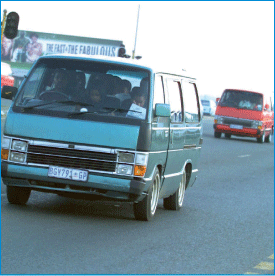 As part of the taxi recapitalisation process, taxi owners who have not been paying tax must do so, but they have an amnesty.
As part of the taxi recapitalisation process, taxi owners who have not been paying tax must do so, but they have an amnesty.
Department of Transport spokesperson Colleen Msibi said that the taxi owners will not have to pay tax from the day they started their business. “They must register from 2006. Those not registered will not be able to change their taxi permits into the new operational licenses.
Registering for tax is part of the process of changing permits into licenses. The deadline for taxi owners to change their permits into licenses was May 31 this year. So far, about 85 per cent of taxi owners have applied for the new licenses,” he said.
Msibi said it was time that taxi owners were treated like any other businesses that pay tax because they were also business people making a profit. – Ndivhuwo Khangale
Bucket toilets removed
Municipalities in Limpopo are spending R7,5-million on projects to give residents toilet (sewerage) systems that work with water. The Greater Tzaneen municipality is spending R4,5 million to connect sewerage pipes to the homes of 480 families. The families, in Lenyenye outside Tzaneen, were using pit toilets. The Greater Letaba municipality is removing septic tanks in Modjadjiskloof (formerly Duiwelskloof) over a period of time, at a cost of R3 million. The project is already underway and is expected to be completed by June next year. A sewerage plant will be built in the town and houses will be linked to a sewerage system that works with water. The project will create a number of jobs in the area. About 45 000 bucket toilets will be removed countrywide and households will be given proper sewerage systems by 2007. This will be done through the Expanded Public Works Programme (EPWP) and the Municipal Infrastructure Grant (MIG). - Neville Maakana, BuaNews
Don’t get tricked!
The SA Police Service (SAPS) warned people to be careful of the “SA 2010 World Cup Bid Lottery.” This is a scam that tricks people into believing that they can win a lot of money. Through letters and e-mail messages, people are told that they won the Lotto, said Captain Percy Morokane of the SAPS. The “winner” would be given some sort of a certificate to “prove” that he had won the prize. He is asked to fill in some forms on the Internet giving personal information such as private banking details. They are also asked to pay a certain amount of money before they can claim their prize. They never receive a prize. “We strongly warn people about this and similar scams,” Morokane said. People who have received any letters or messages asking them for money and information about themselves, must report it to the police. The only way to take part in the Lotto is to buy a Lotto ticket from a National Lottery outlet in South Africa. - Lavinia Mahlangu, BuaNews
Woman's Month
Woman's Month sadminIn South Africa, August is not just another month. It is Women’s Month. On 9 August, National Women’s Day is celebrated as a public holiday. This is because on 9 August 1956, about 20 000 brave women marched to the Union Buildings in Pretoria. They were fighting for their freedom by protesting against the pass laws forced on them by the apartheid government. Lillian Ngoyi, Helen Joseph, Dora Tamana, Sophie de Bruin and Amina Cachalia were among the leaders.
Celebrations
To remember this day and in honour of all South Africa’s brave women, special celebrations will take place countrywide during the whole month of August. As part of the celebrations, the campaign ‘16 Days of Activism for No Violence Against Women and Children’ has been extended to a year-long programme.
365 Days
The new programme is called the 365 Days of Action to End Gender and Child Directed Violence. It aims to strengthen the fight against violence directed at women and children for the whole year and not only during the 16 days period. The Deputy Minister of Provincial and Local Government, Nomatyala Hangana, leads the 365 Days campaign. She said the programme should not be seen as taking the place of the 16 Days.
Rural areas
With this campaign, more attention will be given to women who are at risk of being abused in the rural areas. This is because the 16 Days campaign has been more active in the cities than in rural areas. “We want to change that by empowering women in rural areas through local muni-cipalities,” Hangana said.
What to do if you are raped or abused
- Do not change clothes or wash your body because it might destroy important evidence.
- Report the case to the police as soon as possible. It is best to report within 72 hours so that
evidence such as blood and semen (sperm) can still be collected for testing.
- Do not take any alcohol before going to the police. You need to be clear-headed when you give
your statement.
- The police will refer you to a clinic or a doctor for examination.
- Go for counselling. There are support groups and people who specialise in rape counselling.
National Network on Violence Against Women
National Office: (012) 348-1231/3
Lifeline National Crisis Line
0861 322 322 Batho Pele Gateway Call Centre: 1020
World Cup for the Homeless
World Cup for the Homeless sadmin Soccer skills
From 24 to 30 September, about 500 homeless people from all corners of the world will be showing their soccer skills at the Grand Parade. South Africa will host the 10-day Homeless World Cup for the first time. The Homeless World Cup started in Austria in 2003, and takes place every year. It was held in Scotland last year. Organisations that work with homeless people, drug treatment centres and shelters, choose people from the age of 16 upwards to play in the tournament in these tournaments.
‘Big Issue’
The Homeless World Cup was started by community businessman Mel Young of Scotland. Young started the Big Issue magazine in 1993. The magazine is sold by homeless people at street corners worldwide. It has stories about homeless people and how they can improve their lives. Since the magazine was started in South Africa in 1995, it has helped put more than R8 million into the pockets of homeless and joblesspeople. The head of Big Issue in South Africa, Richard Ishmail, said the tournament helped highlight the talents of soccer players who would otherwise not have a chance.
International support
Ishmail said they worked closely with the Department of Social Development. A task team will help to get other government departments into the project. The tournament is supported by various international companies, as well as the South African Football Association, FIFA, and the SA 2010 FIFA World Cup Local Organising Committee. The matches will be shown on international television and broadcast on radio. SABC will show the final and highlights of the matches. - Ndivhuwo Khangale